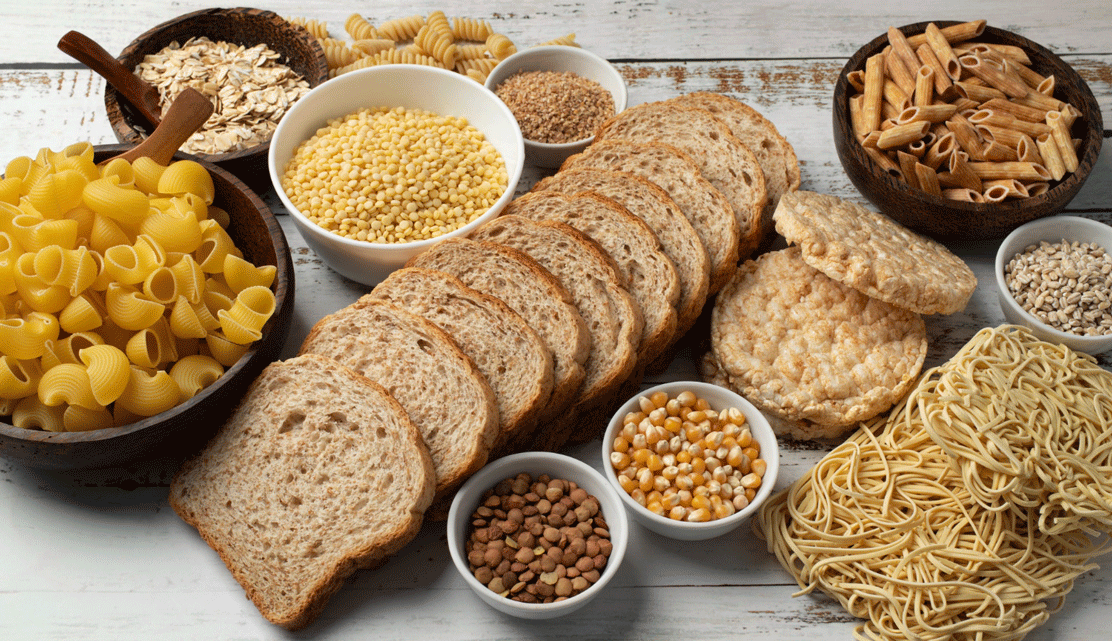Gluten has been a staple in human diets for millennia. It’s what gives bread its elasticity, pizza its chewiness, and pastries their delightful flakiness. For most people, gluten is an unremarkable, if not essential, component of their daily meals.
However, as dietary trends evolve, so do our perceptions of gluten. In recent years, there has been a significant uptick in the number of people adopting gluten-free diets. Some do it as a lifestyle choice, while others are driven by health concerns. This growing interest in gluten-free living is fueled by a range of factors, including anecdotal success stories, celebrity endorsements, and the allure of potentially losing weight and feeling better.
This article seeks to demystify the gluten enigma. We will delve into the science of gluten, its potential health implications, and the conditions associated with gluten intolerance. By the time you finish reading, you’ll have a clearer understanding of gluten, enabling you to make dietary choices that align with your health and lifestyle goals.
What is Gluten?

At its core, gluten is a protein. But not just any protein – it’s the protein that gives many of our favorite foods their unique texture, structure, and mouthfeel. Gluten is found primarily in wheat, barley, rye, and their various derivatives.
One of gluten’s most remarkable characteristics is its elasticity. This property is what allows dough to rise and maintain its shape during baking. When you mix flour with water, the gluten proteins form a network, akin to a microscopic web, that captures carbon dioxide produced by yeast or other leavening agents. This process is what causes dough to expand, creating those delightful air pockets in bread and a tender crumb in cakes.
In essence, gluten acts as the scaffold that holds baked goods together. It’s responsible for the chewiness of bagels, the flakiness of croissants, and the structure of sandwich bread. Without gluten, many of the foods we know and love would be quite different in texture and taste.
Gluten’s elasticity is not just limited to baked goods. It plays a crucial role in the food industry by providing a binding agent in processed foods, improving the texture of sausages, and acting as a stabilizer in sauces and dressings.
So, to summarize: gluten is more than just a protein. It’s a culinary magician, transforming simple ingredients into the diverse array of foods we enjoy every day. However, it’s important to remember that while gluten is a culinary superstar, it’s not universally well-tolerated, which we’ll explore further in this article.
Beyond the Plate: Gluten in Unexpected Places

While we typically associate gluten with foods like bread and pasta, its presence extends far beyond our dinner plates. Gluten can lurk in unexpected places, including medications and cosmetics. This hidden aspect of gluten can be a surprising revelation for those who are sensitive to it.
Gluten in Medications
It might come as a shock to some, but gluten can be found in certain medications. Some prescription and over-the-counter drugs use gluten as a binding agent or filler in their formulations. For individuals with celiac disease or non-celiac gluten sensitivity (NCGS), this can be a concern, as ingesting even small amounts of gluten can trigger adverse reactions.
Fortunately, awareness of this issue is growing, and many pharmaceutical companies now provide information about gluten content on medication labels.
Gluten in Cosmetics
Another surprising source of gluten can be found in cosmetics and personal care products. Some makeup, skincare items, and hair products contain gluten-derived ingredients. Although the risk of ingesting gluten through these products is low, it can be a concern for those with celiac disease or severe gluten sensitivity, especially if the product is applied near the mouth.
If you have such sensitivities, it’s essential to read labels carefully and look for products labeled as gluten-free. Many beauty brands now cater to this need by offering gluten-free cosmetics, making it easier for individuals to maintain their beauty routines without worry.
Debunking Myths About Gluten

Gluten has found itself at the center of numerous myths and misconceptions in recent years. Let’s dive into some of the most prevalent myths and set the record straight.
Myth 1: Gluten is Universally Harmful
Fact: Gluten is not inherently harmful to everyone.
One of the most common misconceptions is that gluten is universally detrimental to our health. This myth has fueled the rise of gluten-free diets among individuals who may not actually require them. In reality, gluten is only problematic for specific groups of people.
Myth 2: Gluten Sensitivity is a Fad
Fact: Non-celiac gluten sensitivity (NCGS) is a real and recognized condition.
There’s often skepticism about NCGS, with some believing it’s merely a dietary trend. However, scientific research has identified NCGS as a legitimate condition. While it lacks the autoimmune response seen in celiac disease, NCGS can still cause a range of symptoms, such as gastrointestinal distress, headaches, and fatigue, in response to gluten consumption.
Myth 3: Gluten-Free Diets are a Guaranteed Path to Health
Fact: Gluten-free diets can be beneficial for those with specific conditions but aren’t inherently healthier for everyone.
Some people adopt gluten-free diets believing they are a guaranteed ticket to better health. However, gluten-free foods can be just as unhealthy as their gluten-containing counterparts. In fact, they often lack essential nutrients, including fiber, vitamins, and minerals. For individuals without gluten-related conditions, a balanced diet that includes gluten can be perfectly healthy.
Myth 4: Gluten is Always to Blame for Digestive Issues
Fact: Digestive problems may have various causes, and gluten isn’t always the culprit.
Attributing all digestive issues to gluten oversimplifies the complexity of gastrointestinal health. Numerous factors, including food intolerances, allergies, and underlying medical conditions, can contribute to digestive problems. It’s crucial to work with a healthcare professional to identify the specific cause of any symptoms before making significant dietary changes.
The Value of Gluten for Most People
While it’s essential to acknowledge gluten-related conditions and sensitivities, it’s equally vital to emphasize the value of gluten as a nutrient. For the majority of the population, gluten-containing foods like whole grains provide essential carbohydrates, fiber, vitamins, and minerals. Eliminating gluten without a medical reason can inadvertently lead to nutrient deficiencies and an unbalanced diet.
The Gluten-Free Diet Craze: Why It’s Gaining Momentum

Over the past decade, gluten-free diets have surged in popularity, becoming more than just a dietary choice for individuals with specific medical conditions. Let’s understand the motivations behind their adoption.
Popularity and Reasons Behind the Trend
Gluten-free diets have become a cultural phenomenon, with more people than ever before opting to go gluten-free. Several factors contribute to this trend:
- Perceived health benefits. Many individuals believe that eliminating gluten will lead to improved digestion, weight loss, and overall well-being.
- Celebrities and influencers. High-profile figures and influencers have endorsed gluten-free diets, contributing to their mainstream appeal.
- Self-diagnosis. Some people self-diagnose as gluten-sensitive and choose to eliminate gluten from their diets without medical confirmation.
Benefits for Celiac Disease and NCGS
For individuals with celiac disease or non-celiac gluten sensitivity (NCGS), a gluten-free diet is medically necessary and can provide tangible benefits:
- Celiac disease. Celiac disease is an autoimmune condition triggered by gluten consumption. For those with celiac disease, a gluten-free diet is the only known treatment, as it prevents damage to the small intestine and alleviates symptoms.
- NCGS. While the mechanisms are not entirely understood, individuals with NCGS experience real symptoms when consuming gluten. A gluten-free diet can provide relief from these symptoms, which may include digestive discomfort, headaches, and fatigue.
Drawbacks of a Gluten-Free Diet
However, it’s essential to recognize that a gluten-free diet is not without its challenges and drawbacks:
- Nutritional deficiencies. Gluten-free diets can lack essential nutrients like fiber, B vitamins, and iron, as many gluten-free products are not fortified to the same extent as their gluten-containing counterparts.
- Higher costs. Gluten-free foods are often more expensive than their gluten-containing equivalents, placing a financial burden on those who require gluten-free diets.
- Limited food choices. Eliminating gluten can restrict food choices, making it challenging to dine out or enjoy traditional dishes.
- Social and emotional impact. Living gluten-free can be socially isolating and emotionally challenging, as it may require significant lifestyle adjustments.
The rise of gluten-free diets is driven by a combination of health perceptions, celebrity endorsements, and self-diagnosis. If you have celiac disease and NCGS, it’s crucial to consult with healthcare professionals who can provide personalized guidance and ensure that such decisions are based on medical necessity rather than popular trends or misconceptions. Your health is too valuable to be left to chance; seek professional advice for a sound dietary journey.
Navigating the Gluten Maze: Informed Choices for a Healthier You

In our journey through the world of gluten, we’ve uncovered the truths, dispelled the myths, and shed light on the complexities of this protein. As we conclude, let’s recap the key takeaways and encourage you to make informed choices regarding gluten in your diet:
Key Takeaways
- Gluten defined. Gluten is a protein found in wheat, barley, rye, and their derivatives, known for its elastic properties that play a crucial role in baking.
- Gluten myths debunked. While gluten has been unfairly vilified in recent years, it is not universally harmful. It can be problematic for those with specific conditions, such as celiac disease or non-celiac gluten sensitivity, but not for everyone.
- Gluten-free diet trends. The rise of gluten-free diets is influenced by various factors, including health perceptions, celebrity endorsements, and self-diagnosis. While beneficial for individuals with celiac disease or NCGS, it’s essential to recognize the drawbacks, such as potential nutritional deficiencies and higher costs.
- Consultation with healthcare professionals. Before making significant dietary changes, consult with healthcare professionals who can provide personalized guidance and accurate diagnoses, especially if you suspect gluten-related issues.
Final Thoughts
In closing, remember that gluten is not inherently harmful. It’s a valuable component of many foods that contributes to their texture and structure. However, it can be problematic for specific individuals, and this should be addressed with the guidance of healthcare professionals.
As you make dietary choices, whether you opt for a gluten-free diet or not, do so with the wisdom of informed decisions. Prioritize balance, seek professional advice when needed, and remember that your health journey is unique to you. Gluten may be a hot topic, but your health is even more important. Make choices that align with your well-being, and enjoy the diverse array of foods that nourish both your body and soul.
This is where an application such as the UMA App steps in – serving as your reliable companion and guide on a secure culinary adventure, helping you stay informed about your food choices and dining options. Available on App Store & Google Play.

